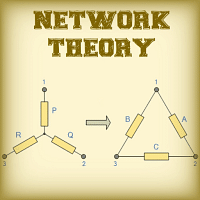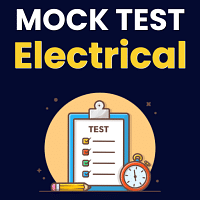Electrical Engineering (EE) Exam > Electrical Engineering (EE) Questions > Which of the following motors is non-self sta...
Start Learning for Free
Which of the following motors is non-self starting?
- a)D.C. series motor
- b)synchronous motor
- c)Squirrel cage induction motor
- d)Wound round induction motor
Correct answer is option 'B'. Can you explain this answer?
| FREE This question is part of | Download PDF Attempt this Test |
Most Upvoted Answer
Which of the following motors is non-self starting?a)D.C. series motor...
Non-Self Starting Motors
Introduction:
In the field of electrical engineering, different types of motors are used for various applications. One important classification of motors is based on their self-starting capability. A self-starting motor is one that can start on its own without any external assistance. On the other hand, a non-self starting motor requires external assistance to start and achieve a running condition. Among the given options, the synchronous motor is a non-self starting motor.
Synchronous Motor:
A synchronous motor is a type of AC motor that operates at a synchronous speed, which is directly proportional to the frequency of the power supply and inversely proportional to the number of poles in the motor. The synchronous motor requires external assistance to start and synchronize with the power supply before it can operate on its own.
Working Principle:
- The synchronous motor has two main components: a stator and a rotor.
- The stator consists of field windings that produce a rotating magnetic field when connected to an AC power supply.
- The rotor is a cylindrical structure with salient poles, and it carries direct current (DC) to create a magnetic field.
- When the stator magnetic field interacts with the rotor magnetic field, torque is produced, causing the motor to rotate.
Non-Self Starting Nature:
The synchronous motor is non-self starting due to the following reasons:
- When the synchronous motor is initially connected to the power supply, the stator magnetic field starts rotating. However, the rotor poles are not aligned with the stator poles.
- As a result, there is no torque generated, and the motor cannot start on its own.
- To make the motor start, external means such as a starting motor or a prime mover (e.g., another motor) are required to bring the rotor close to the synchronous speed.
- Once the rotor speed matches the synchronous speed, synchronization occurs, and the motor can continue to operate independently.
Conclusion:
Among the given options, the synchronous motor is the non-self starting motor. It requires external assistance to start and synchronize with the power supply. Once synchronized, it can operate independently.
Introduction:
In the field of electrical engineering, different types of motors are used for various applications. One important classification of motors is based on their self-starting capability. A self-starting motor is one that can start on its own without any external assistance. On the other hand, a non-self starting motor requires external assistance to start and achieve a running condition. Among the given options, the synchronous motor is a non-self starting motor.
Synchronous Motor:
A synchronous motor is a type of AC motor that operates at a synchronous speed, which is directly proportional to the frequency of the power supply and inversely proportional to the number of poles in the motor. The synchronous motor requires external assistance to start and synchronize with the power supply before it can operate on its own.
Working Principle:
- The synchronous motor has two main components: a stator and a rotor.
- The stator consists of field windings that produce a rotating magnetic field when connected to an AC power supply.
- The rotor is a cylindrical structure with salient poles, and it carries direct current (DC) to create a magnetic field.
- When the stator magnetic field interacts with the rotor magnetic field, torque is produced, causing the motor to rotate.
Non-Self Starting Nature:
The synchronous motor is non-self starting due to the following reasons:
- When the synchronous motor is initially connected to the power supply, the stator magnetic field starts rotating. However, the rotor poles are not aligned with the stator poles.
- As a result, there is no torque generated, and the motor cannot start on its own.
- To make the motor start, external means such as a starting motor or a prime mover (e.g., another motor) are required to bring the rotor close to the synchronous speed.
- Once the rotor speed matches the synchronous speed, synchronization occurs, and the motor can continue to operate independently.
Conclusion:
Among the given options, the synchronous motor is the non-self starting motor. It requires external assistance to start and synchronize with the power supply. Once synchronized, it can operate independently.
Free Test
FREE
| Start Free Test |
Community Answer
Which of the following motors is non-self starting?a)D.C. series motor...
A synchronous motor is a type of AC motor that operates at a fixed speed determined by the frequency of the power supply and the number of poles. Unlike other AC motors, a synchronous motor does not inherently have the ability to start on its own.
To start a synchronous motor, external means, such as a separate starting mechanism or auxiliary motor, are required. This is because a synchronous motor requires the rotor to be synchronized with the rotating magnetic field generated by the stator. Without proper synchronization, the motor will not start and will not develop torque.
On the other hand, the other motor types listed in the options are self-starting motors:
- A D.C. series motor (Option A) is a self-starting motor that can develop torque as soon as the power is supplied.
- A squirrel cage induction motor (Option C) is a self-starting motor that relies on the induction principle to develop torque and start rotating. The design of the squirrel cage rotor allows it to start even without external means.
- A wound rotor induction motor (Option D) is also a self-starting motor. The rotor windings can be connected to external resistors or other devices to control the motor's starting characteristics, but it is capable of starting on its own.
Therefore, the correct answer is B) synchronous motor, as it is the only motor among the options that is non-self starting.
Attention Electrical Engineering (EE) Students!
To make sure you are not studying endlessly, EduRev has designed Electrical Engineering (EE) study material, with Structured Courses, Videos, & Test Series. Plus get personalized analysis, doubt solving and improvement plans to achieve a great score in Electrical Engineering (EE).

|
Explore Courses for Electrical Engineering (EE) exam
|

|
Similar Electrical Engineering (EE) Doubts
Which of the following motors is non-self starting?a)D.C. series motorb)synchronous motorc)Squirrel cage induction motord)Wound round induction motorCorrect answer is option 'B'. Can you explain this answer?
Question Description
Which of the following motors is non-self starting?a)D.C. series motorb)synchronous motorc)Squirrel cage induction motord)Wound round induction motorCorrect answer is option 'B'. Can you explain this answer? for Electrical Engineering (EE) 2024 is part of Electrical Engineering (EE) preparation. The Question and answers have been prepared according to the Electrical Engineering (EE) exam syllabus. Information about Which of the following motors is non-self starting?a)D.C. series motorb)synchronous motorc)Squirrel cage induction motord)Wound round induction motorCorrect answer is option 'B'. Can you explain this answer? covers all topics & solutions for Electrical Engineering (EE) 2024 Exam. Find important definitions, questions, meanings, examples, exercises and tests below for Which of the following motors is non-self starting?a)D.C. series motorb)synchronous motorc)Squirrel cage induction motord)Wound round induction motorCorrect answer is option 'B'. Can you explain this answer?.
Which of the following motors is non-self starting?a)D.C. series motorb)synchronous motorc)Squirrel cage induction motord)Wound round induction motorCorrect answer is option 'B'. Can you explain this answer? for Electrical Engineering (EE) 2024 is part of Electrical Engineering (EE) preparation. The Question and answers have been prepared according to the Electrical Engineering (EE) exam syllabus. Information about Which of the following motors is non-self starting?a)D.C. series motorb)synchronous motorc)Squirrel cage induction motord)Wound round induction motorCorrect answer is option 'B'. Can you explain this answer? covers all topics & solutions for Electrical Engineering (EE) 2024 Exam. Find important definitions, questions, meanings, examples, exercises and tests below for Which of the following motors is non-self starting?a)D.C. series motorb)synchronous motorc)Squirrel cage induction motord)Wound round induction motorCorrect answer is option 'B'. Can you explain this answer?.
Solutions for Which of the following motors is non-self starting?a)D.C. series motorb)synchronous motorc)Squirrel cage induction motord)Wound round induction motorCorrect answer is option 'B'. Can you explain this answer? in English & in Hindi are available as part of our courses for Electrical Engineering (EE).
Download more important topics, notes, lectures and mock test series for Electrical Engineering (EE) Exam by signing up for free.
Here you can find the meaning of Which of the following motors is non-self starting?a)D.C. series motorb)synchronous motorc)Squirrel cage induction motord)Wound round induction motorCorrect answer is option 'B'. Can you explain this answer? defined & explained in the simplest way possible. Besides giving the explanation of
Which of the following motors is non-self starting?a)D.C. series motorb)synchronous motorc)Squirrel cage induction motord)Wound round induction motorCorrect answer is option 'B'. Can you explain this answer?, a detailed solution for Which of the following motors is non-self starting?a)D.C. series motorb)synchronous motorc)Squirrel cage induction motord)Wound round induction motorCorrect answer is option 'B'. Can you explain this answer? has been provided alongside types of Which of the following motors is non-self starting?a)D.C. series motorb)synchronous motorc)Squirrel cage induction motord)Wound round induction motorCorrect answer is option 'B'. Can you explain this answer? theory, EduRev gives you an
ample number of questions to practice Which of the following motors is non-self starting?a)D.C. series motorb)synchronous motorc)Squirrel cage induction motord)Wound round induction motorCorrect answer is option 'B'. Can you explain this answer? tests, examples and also practice Electrical Engineering (EE) tests.

|
Explore Courses for Electrical Engineering (EE) exam
|

|
Suggested Free Tests
Signup for Free!
Signup to see your scores go up within 7 days! Learn & Practice with 1000+ FREE Notes, Videos & Tests.
























